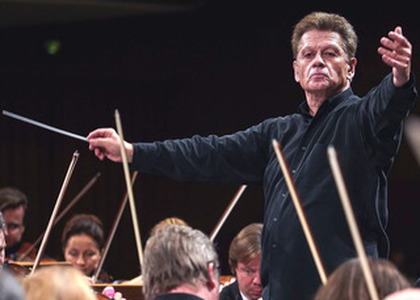> [Archived] Interviews

Interview with conductor Christian Badea
Friday, on the 31st of March from 19:00, young piano-player Eva Garet is going to grow together with Orchestra Națională Radio under the baton of conductor Christian Badea. On the Sala Radio stage, the audience will be able to listen to Tchaikovsky's Piano Concerto No.1 and Symphony No.2 by Johannes Brahms.
How do you feel about this Brahms-Tchaikovskyconjunction?
I think that it is quite a fortunate one, in the sense that it is a different kind of romanticism, from Tchaikovskyto Brahms, but we stay in this romantic field, with very stricking characteristic at both composers. The public is usually very, very receptive to the romantic repertoire, not only in Romania, but in other places as well. And in addition I say this again, because there are some who see things a little different. The audience likes to listen to things they know because they feel comfortable. People come with pleasure because they have no unpleasant surprises. Now, if you don't know the repertoire and you come to a concert, you can have many pleasant surprises with music that you do not know and that you love, but in this case we are in the "traditional" repertoire. I feel like I'm in my element when interpreting Tchaikovsky, Brahms, ever since I started as a violinist. I performed Tchaikovsky when I was a violinist. I performed Brahms:his concerts, his sonatas, they are like childhood friends.
I would like you to tell us a bit about the soloist from Friday, Eva Garet.
Eva Garet is a very special case, a phenomenon even. I do use big words, so I'm going to be very attentive at what I'm saying, this is also reflected on my attitude and interest towards her, an interest that I had since I've first listened to her. It was in fact a video of her from when she was 14 and she was performing Listz, a I thought to myself "it is not possible for such a young girl not only to perform Listz, but to do with maturity, with emotional power", and I really took an interest to it. And after that I've got to know her better and we performed.I've then talked to her. She is more timid and she likes to talk more with the music. I met her family, her teacher, Mrs. Zamfirescu, it was such a "get to know you" process. Eve has a gift from God, in the sense that she has an extraordinary technical facility, so she does not care, and has all sorts of abilities and tools that are not all evident in the same artist. She has a very high and fast assimilation capacity and when something takes a place in her soul, in her mind or fingers, and when this thing is very well seated, it's as if someone from somewhere, more magical, more mystical, would tell her how things should go.This is what I call "talent". She has never performed Tchaikovsky's work before. She started learning it about three months ago, she learned it very, very quickly and after that, of course, she perfected it. She is very passionate about it, she likes Liszt very much and what I like to see is this: When I was very young, I worked withvery big artists in New York. For example Yo-Yo Ma, Yef Bronfman, Manny Ax, Shlomo Mintz and so on, artists who were 18, 19 or 20 years old at the time, therefore not older than how Eva is now. They performed beautifully, very well and they had this potential: you could feel that it was only their beginning and that they would progress and they did, carefree, without dread, they did it organically and naturally, just as Eva does now. So, I now see Eva in a really high and special category, projecting what will happen in the following years.
Translated by Georgiana Morozii,
University of Bucharest, Faculty of Foreign Languages and Literatures, MTTLC, year I Corrected by Silvia Petrescu














